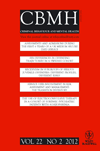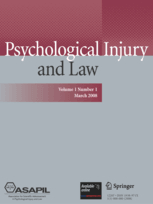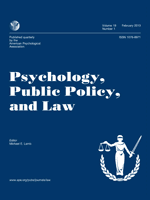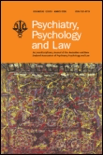
Psychology and Law
Scope & Guideline
Advancing interdisciplinary dialogue between psychology and law.
Introduction
Aims and Scopes
- Interdisciplinary Research:
The journal promotes interdisciplinary research that integrates psychological theories and methodologies with legal practices, providing insights into the functioning of legal systems and the behavior of individuals within those systems. - Mental Health and Law:
A consistent focus on the implications of mental health issues within the legal context, including the assessment of mental competence, the treatment of offenders with mental disorders, and the exploration of mental health in judicial processes. - Forensic Psychology:
The journal publishes studies on forensic psychology, examining aspects such as risk assessment, criminal behavior, eyewitness testimony, and the psychological evaluation of defendants, which are crucial for legal decision-making. - Policy and Practice Implications:
Research that offers practical implications for policy, particularly in areas such as sentencing, diversion programs, and the treatment of vulnerable populations within the criminal justice system. - Cultural and Social Dimensions:
An emphasis on the cultural and social factors influencing legal processes and outcomes, including studies on marginalized groups and the impact of societal attitudes on justice.
Trending and Emerging
- Mental Health and Criminal Justice:
An increasing focus on the intersection between mental health and the criminal justice system, particularly regarding the treatment of individuals with mental disorders and the implications of mental health assessments on legal outcomes. - Trauma and Its Legal Implications:
Research exploring trauma, especially in relation to victims and witnesses, is on the rise. This includes studies on trauma-informed practices in legal settings, reflecting a broader movement towards understanding the psychological impact of legal processes. - Diversity and Inclusion in Legal Contexts:
Emerging themes around diversity, including the experiences of Indigenous populations and other marginalized groups in the legal system, are becoming more prominent, highlighting the need for culturally sensitive legal practices. - Innovative Forensic Assessment Tools:
There is a trend towards developing and validating new forensic assessment tools that incorporate psychological insights, aiming to improve accuracy in legal decision-making. - Impact of Technology on Law and Psychology:
Research examining the influence of technology on legal processes, such as online interactions and the use of digital evidence in court, is gaining traction, reflecting the changing nature of evidence and communication in the legal field.
Declining or Waning
- Traditional Legal Doctrines:
There appears to be a waning interest in traditional legal doctrines and their psychological implications, as more researchers shift towards contemporary issues such as mental health and social justice. - General Crime Trends:
While still relevant, general crime trends and statistics seem to be receiving less attention in favor of more nuanced studies that focus on specific populations or psychological phenomena related to criminal behavior. - Classic Forensic Assessments:
Research centered on classic forensic assessments and tools, such as older risk assessment models, is decreasing as newer, more dynamic approaches gain traction in the field. - Historical Perspectives on Law and Psychology:
Studies that focus on historical perspectives of law and psychology are becoming less common, with a move towards current and future implications of psychological research on legal practices.
Similar Journals

Forensische Psychiatrie Psychologie Kriminologie
Championing Evidence-Based Practices in Forensic Fields.Forensische Psychiatrie Psychologie Kriminologie is a leading academic journal published by SPRINGER HEIDELBERG, specializing in the intersection of forensic psychiatry, psychology, and criminology. With an ISSN of 1862-7072 and E-ISSN 1862-7080, this journal has built a reputable place in the academic community, featuring essential research that informs the critical dialogue on legal and psychological practices as they pertain to mental health and criminal behavior. Indexed in Scopus, it holds a diverse range of impact factors across multiple disciplines, including a Q2 ranking in Law and notable placements within Applied Psychology and Psychiatry and Mental Health. The journal's commitment to advancing evidence-based practices and understanding of forensic mental health is evident from its broad editorial scope, making it a vital resource for researchers, clinicians, and students alike. The journal spans a timeline from 2007 to 2024, ensuring that it provides up-to-date insights into evolving methodologies and findings within this critical field.

Journal of Police and Criminal Psychology
Unraveling the Complexities of Crime through Psychological ResearchThe Journal of Police and Criminal Psychology, published by Springer, is a leading scholarly periodical that explores the intricate intersections of psychological principles and law enforcement practices. Founded in 1985, this esteemed journal serves as an essential resource for researchers, practitioners, and students alike, addressing contemporary issues in applied psychology and law, and has achieved a commendable position in its field, with a 2023 Scopus ranking of #128 in Law and #123 in Applied Psychology. With an impressive impact factor, it reflects the journal's commitment to advancing knowledge and fostering dialogues surrounding criminal behavior, law enforcement strategies, and psychological assessments. The journal maintains a non-open access model, ensuring rigorous peer-review standards while reaching a global audience interested in the psychological dimensions of criminal justice. As it continues to converge into 2024, the Journal of Police and Criminal Psychology remains dedicated to fostering groundbreaking research and facilitating critical insights that inform policy and practice in police psychology.

Criminal Behaviour and Mental Health
Bridging the Gap Between Criminality and PsychologyCriminal Behaviour and Mental Health, published by WILEY, is a pivotal journal that investigates the intricate relationships between criminal behavior and psychological health. With its ISSN 0957-9664 and E-ISSN 1471-2857, this journal serves as a vital resource for researchers and professionals in the fields of forensic psychology, psychiatry, and pathology. As a recognized publication in the Q3 category across multiple disciplines, including Medicine, Psychiatry, and Psychology as of 2023, it provides an essential platform for disseminating cutting-edge research and discussions pertinent to the intersection of criminality and mental health. Although currently not available as Open Access, the journal remains an influential part of the global academic landscape with a commitment to advancing understanding in this critical area. Its historical span from 1992 to 2024 signifies a long-standing dedication to exploring the complexities of mental health in the context of criminal behavior, making it an invaluable tool for students, practitioners, and researchers alike.

PSYCHOLOGY CRIME & LAW
Exploring the Nexus of Mind, Crime, and JusticePSYCHOLOGY CRIME & LAW, published by Routledge Journals, Taylor & Francis Ltd, is a premier academic journal dedicated to the intersection of psychology, criminology, and the law. With an ISSN of 1068-316X and an E-ISSN of 1477-2744, this journal provides a critical platform for the dissemination of cutting-edge research and innovative methodologies in the fields of psychology, forensic medicine, and legal studies. Spanning over three decades (1994 to 2024), it holds impressive Scopus rankings, placing it in Q1 and Q2 quartiles for its contributions to law and forensic medicine, highlighting its standing within the academic community. PSYCHOLOGY CRIME & LAW is particularly noted for addressing contemporary issues at the crossroads of human behavior and legal standards, making it essential reading for scholars, practitioners, and students alike. While the journal is not open access, it offers valuable insights into a variety of topics, from criminal psychology to the implications of mental health in legal contexts, ensuring that it remains an influential resource for those engaged in research and professional practice.

European Journal of Psychology Applied to Legal Context
Fostering Collaboration Between Psychology and Legal ExpertsThe European Journal of Psychology Applied to Legal Context, published by the COLEGIO OFICIAL PSICOLOGOS MADRID, is a premier open-access journal that has been contributing to the interdisciplinary fields of psychology and law since its inception in 2009. With an E-ISSN of 1989-4007, the journal has established itself as a leading outlet for innovative research, boasting impressive Scopus rankings—3rd in Social Sciences (Law) and 9th in Psychology (Applied Psychology), both within the prestigious Q1 quartile category for 2023. This significant impact reflects the journal's commitment to advancing scholarly understanding and application of psychological principles in legal contexts, making it an essential resource for researchers, professionals, and students. Distributed globally, the journal offers unrestricted access to its articles since 2013, aligning with the shared goal of enhancing knowledge and fostering collaboration among diverse academic and professional communities. By bridging the gap between psychological research and legal practice, the European Journal of Psychology Applied to Legal Context plays a crucial role in shaping policy, guiding best practices, and informing education in both fields.

Psychological Injury & Law
Bridging Psychology and Law for a Healthier TomorrowPsychological Injury & Law, published by SPRINGER, stands at the forefront of interdisciplinary research, merging insights from the fields of law, psychology, and mental health. With an ISSN of 1938-971X and an E-ISSN of 1938-9728, this esteemed journal aims to address the complexities of psychological injuries within legal contexts, providing a platform for scholars to explore the intersection of legal principles and psychological well-being. Recognized for its rigor, it has achieved a Q1 ranking in both Ecology and Law, and a Q2 ranking in Psychiatry and Mental Health for 2023, demonstrating its influence and contribution to these fields. Additionally, with impressive Scopus ranks placing it in the 95th percentile within Social Sciences (Law) and the 70th percentile in Medicine (Psychiatry and Mental Health), the journal consistently showcases high-quality, impactful research that resonates with professionals, academics, and students alike. By fostering a deeper understanding of psychological injuries, it serves as an essential resource for those seeking to navigate the intricate relationships between mental wellness and legal frameworks.

JOURNAL OF FORENSIC PSYCHIATRY & PSYCHOLOGY
Empowering Research at the Crossroads of Forensic ScienceJOURNAL OF FORENSIC PSYCHIATRY & PSYCHOLOGY, published by Routledge Journals, Taylor & Francis Ltd, is a pivotal platform for advancing knowledge at the intersection of psychology, psychiatry, and the legal system. With an ISSN of 1478-9949, this esteemed journal has been providing a critical forum since its inception in 2003, continuing through to 2024, to foster interdisciplinary dialogue among researchers, clinicians, and legal professionals. The journal holds a Q3 category ranking in both Clinical Psychology and Psychiatry and Mental Health, reflecting its important contributions to the field. With a focus on empirical research, theoretical perspectives, and case studies, it aims to enhance the understanding of forensic issues while ensuring ethical considerations in psychological assessments and interventions. Although it currently does not provide open access, the journal's rigorous peer-review process assures high-quality publications. Researchers looking to stay at the forefront of forensic psychology will find this publication indispensable for their scholarly work and practical applications.

INTERNATIONAL JOURNAL OF OFFENDER THERAPY AND COMPARATIVE CRIMINOLOGY
Enhancing understanding of comparative criminology.INTERNATIONAL JOURNAL OF OFFENDER THERAPY AND COMPARATIVE CRIMINOLOGY, published by SAGE PUBLICATIONS INC, is a leading journal in the fields of criminology, psychology, and forensic medicine, with a robust legacy dating back to 1966. With ISSN 0306-624X and E-ISSN 1552-6933, this journal presents innovative research and theoretical discussions that seek to improve offender rehabilitation and comparative criminological studies. The journal’s high-impact contributions have garnered it a prestigious Q1 ranking in Arts and Humanities and a Q2 ranking in Pathology and Forensic Medicine as of 2023, making it a valuable resource for scholars and practitioners alike. Researchers will find the journal's commitment to advancing knowledge through empirical evidence and critical analysis particularly compelling, as it addresses contemporary challenges in offender therapy. Though not an Open Access journal, its diverse scope ensures that readers have access to pivotal insights that drive progress and inform policy in justice and rehabilitation systems. With a focus on interdisciplinary approaches, the journal serves as an essential platform for academics, professionals, and students aiming to deepen their understanding of comparative criminology and its applications.

PSYCHOLOGY PUBLIC POLICY AND LAW
Illuminating the Psychological Forces Shaping Legal Decisions.Psychology, Public Policy, and Law is an esteemed peer-reviewed journal published by the American Psychological Association (APA), focusing on the intersection of psychology and law. With a rich history dating back to 1995, the journal has solidified its importance in shaping legal practices and public policy through empirical research and theoretical analysis. It enjoys a prestigious ranking, notably within the Q1 category in both Law and Sociology & Political Science for 2023, reflecting its impactful contributions to these fields. Although access is not open, the journal is essential for researchers, practitioners, and students who seek to understand the psychological dimensions influencing legal decisions and policies. The journal's robust publication includes studies that provide insights on critical issues affecting society, making it a vital resource for advancing knowledge and informing policy at local, national, and international levels. With an ISSN of 1076-8971 and an e-ISSN of 1939-1528, it stands as a leading outlet for innovative research that bridges the gap between psychology, law, and public policy.

Psychiatry Psychology and Law
Bridging Mental Health and Legal LandscapesPsychiatry Psychology and Law is a prestigious journal dedicated to advancing the understanding of the interconnections among mental health, psychological conditions, and legal contexts. Published by Routledge Journals, Taylor & Francis Ltd, this journal plays a pivotal role in the field, evidenced by its impressive Q1 ranking in Law and notable positions in multiple disciplines such as Psychiatry and Forensic Medicine. With a commitment to disseminating high-quality research, it has established itself as an essential resource for researchers, professionals, and students in psychology and legal studies. While currently not offering Open Access options, the journal thrives on rigorous peer review processes that ensure only the most impactful studies from its inception in 1994 to the present are published. Covering a diverse range of topics, Psychiatry Psychology and Law fosters interdisciplinary dialogue and innovation, making it a vital platform for advancing scholarly discourse in the critical intersection of mental health and law.